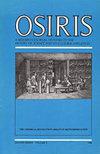Lies, Damned Lies, and (Bourgeois) Statistics: Ascertaining Social Fact in Midcentury China and the Soviet Union
IF 1
3区 哲学
Q2 HISTORY & PHILOSOPHY OF SCIENCE
引用次数: 3
Abstract
Is there a correct way to ascertain social fact? As late as the 1950s, the scientific community remained divided over this question. Its resolution involved not just epistemological and theoretical debates on the unity or disunity of statistical science but also practical considerations surrounding state-capacity building. For scientists in places like the People’s Republic of China (PRC) and the Soviet Union, at stake was the very ability to realize the kind of planned economic growth that socialist countries idealized. The solution they chose reformulated statistics explicitly as a social science, salvaging it from what they then dismissed as the tainted, bourgeois, and socially unproductive pursuit of mathematical statistics. This distinction—most tangibly understood as the rejection of all probabilistic methods—had implications for both the ways in which data was collected and the ways in which it was analyzed.谎言、该死的谎言与(资产阶级的)统计:确定上世纪中叶中国和苏联的社会事实
有确定社会事实的正确方法吗?直到20世纪50年代,科学界在这个问题上仍然存在分歧。它的解决方案不仅涉及关于统计科学统一性或不统一性的认识论和理论辩论,还涉及围绕国家能力建设的实际考虑。对于像中华人民共和国和苏联这样的国家的科学家来说,实现社会主义国家所理想的那种计划经济增长的能力是至关重要的。他们选择的解决方案是将统计学明确地重新表述为一门社会科学,将其从被他们视为受污染的、资产阶级的、对社会无益的数学统计追求中拯救出来。这种区别——最明显的理解是对所有概率方法的拒绝——对数据收集和分析的方式都有影响。
本文章由计算机程序翻译,如有差异,请以英文原文为准。
求助全文
约1分钟内获得全文
求助全文
来源期刊

Osiris
管理科学-科学史与科学哲学
CiteScore
1.10
自引率
0.00%
发文量
18
审稿时长
>12 weeks
期刊介绍:
Founded in 1936 by George Sarton, and relaunched by the History of Science Society in 1985, Osiris is an annual thematic journal that highlights research on significant themes in the history of science. Recent volumes have included Scientific Masculinities, History of Science and the Emotions, and Data Histories.
 求助内容:
求助内容: 应助结果提醒方式:
应助结果提醒方式:


